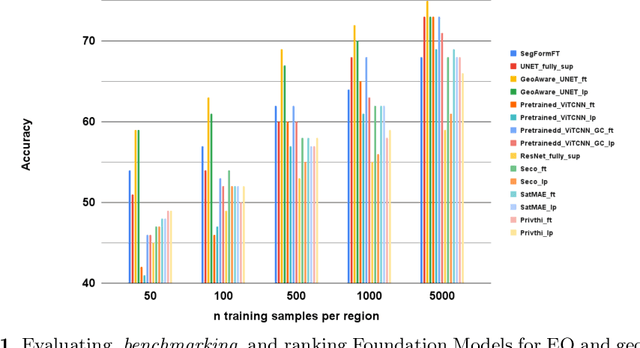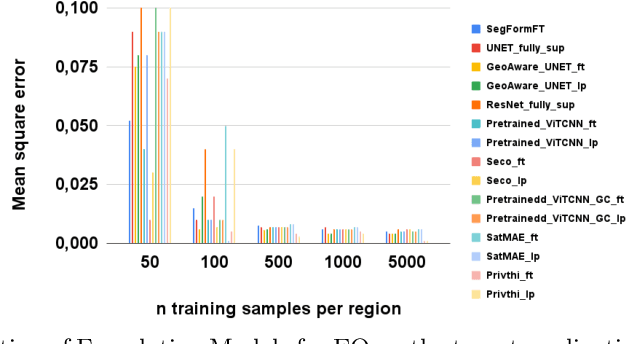Jente Bosmans
Scaling-Up the Pretraining of the Earth Observation Foundation Model PhilEO to the MajorTOM Dataset
Jun 17, 2025



Abstract:Today, Earth Observation (EO) satellites generate massive volumes of data, with the Copernicus Sentinel-2 constellation alone producing approximately 1.6TB per day. To fully exploit this information, it is essential to pretrain EO Foundation Models (FMs) on large unlabeled datasets, enabling efficient fine-tuning for several different downstream tasks with minimal labeled data. In this work, we present the scaling-up of our recently proposed EO Foundation Model, PhilEO Geo-Aware U-Net, on the unlabeled 23TB dataset MajorTOM, which covers the vast majority of the Earth's surface, as well as on the specialized subset FastTOM 2TB that does not include oceans and ice. We develop and study various PhilEO model variants with different numbers of parameters and architectures. Finally, we fine-tune the models on the PhilEO Bench for road density estimation, building density pixel-wise regression, and land cover semantic segmentation, and we evaluate the performance. Our results demonstrate that for all n-shots for road density regression, the PhilEO 44M MajorTOM 23TB model outperforms PhilEO Globe 0.5TB 44M. We also show that for most n-shots for road density estimation and building density regression, PhilEO 200M FastTOM outperforms all the other models. The effectiveness of both dataset and model scaling is validated using the PhilEO Bench. We also study the impact of architecture scaling, transitioning from U-Net Convolutional Neural Networks (CNN) to Vision Transformers (ViT).
TerraMind: Large-Scale Generative Multimodality for Earth Observation
Apr 15, 2025



Abstract:We present TerraMind, the first any-to-any generative, multimodal foundation model for Earth observation (EO). Unlike other multimodal models, TerraMind is pretrained on dual-scale representations combining both token-level and pixel-level data across modalities. On a token level, TerraMind encodes high-level contextual information to learn cross-modal relationships, while on a pixel level, TerraMind leverages fine-grained representations to capture critical spatial nuances. We pretrained TerraMind on nine geospatial modalities of a global, large-scale dataset. In this paper, we demonstrate that (i) TerraMind's dual-scale early fusion approach unlocks a range of zero-shot and few-shot applications for Earth observation, (ii) TerraMind introduces "Thinking-in-Modalities" (TiM) -- the capability of generating additional artificial data during finetuning and inference to improve the model output -- and (iii) TerraMind achieves beyond state-of-the-art performance in community-standard benchmarks for EO like PANGAEA. The pretraining dataset, the model weights, and our code is open-sourced under a permissive license.
CARE: Confidence-Aware Regression Estimation of building density fine-tuning EO Foundation Models
Feb 19, 2025



Abstract:Performing accurate confidence quantification and assessment is important for deep neural networks to predict their failures, improve their performance and enhance their capabilities in real-world applications, for their practical deployment in real life. For pixel-wise regression tasks, confidence quantification and assessment has not been well addressed in the literature, in contrast to classification tasks like semantic segmentation. The softmax output layer is not used in deep neural networks that solve pixel-wise regression problems. In this paper, to address these problems, we develop, train and evaluate the proposed model Confidence-Aware Regression Estimation (CARE). Our model CARE computes and assigns confidence to regression output results. We focus on solving regression problems as downstream tasks of an AI Foundation Model for Earth Observation (EO). We evaluate the proposed model CARE and experimental results on data from the Copernicus Sentinel-2 satellite constellation for estimating the density of buildings show that the proposed method can be successfully applied to regression problems. We also show that our approach outperforms other methods.
Evaluating and Benchmarking Foundation Models for Earth Observation and Geospatial AI
Jun 26, 2024

Abstract:When we are primarily interested in solving several problems jointly with a given prescribed high performance accuracy for each target application, then Foundation Models should for most cases be used rather than problem-specific models. We focus on the specific Computer Vision application of Foundation Models for Earth Observation (EO) and geospatial AI. These models can solve important problems we are tackling, including for example land cover classification, crop type mapping, flood segmentation, building density estimation, and road regression segmentation. In this paper, we show that for a limited number of labelled data, Foundation Models achieve improved performance compared to problem-specific models. In this work, we also present our proposed evaluation benchmark for Foundation Models for EO. Benchmarking the generalization performance of Foundation Models is important as it has become difficult to standardize a fair comparison across the many different models that have been proposed recently. We present the results using our evaluation benchmark for EO Foundation Models and show that Foundation Models are label efficient in the downstream tasks and help us solve problems we are tackling in EO and remote sensing.
 Add to Chrome
Add to Chrome Add to Firefox
Add to Firefox Add to Edge
Add to Edge